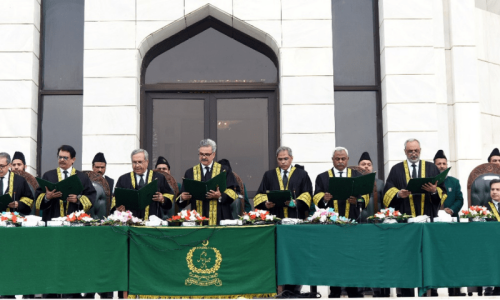As the coronavirus drifts the global economy towards recession, the pandemic has already dealt a mighty blow to Pakistan’s economy. The partial shutdown has hit the livelihoods of millions.
The cash-based, labour-intensive informal sector, trading, transport, construction, event management and eatery businesses are struck the hardest. Historically in Pakistan, they afforded the resilience to the economy in slow GDP growth phases.
Among the provinces, the economic toll would probably be higher in trade-dependent Balochistan and Khyber Pakhtunkhwa compared to Sindh and Punjab that have relatively big agricultural and industrial bases.
The informal economy includes self-employed service providers, such as mochi (cobblers), nai (hairdresser), mistri (mason), carpenters, plumbers, electricians, thele walas (pushcart vendors), etc. They have slowly been driven out of the market as the scare and the lockdown deepen.
The impact is expected to be more severe in densely populated urban areas (clustered shanty townships) compared to rural areas where the population is more dispersed and its dependence on the market for the provision of essentials is comparatively limited. Though often devoid of amenities (running tap water, gas, electricity and sewage system), many rural households are self-sustaining.
No government, even in the richest of the countries, can handle a crisis of this scale by itself. In Pakistan where the capacity and resources of the government are limited, it would be apt to pool public and private resources to deal with the crisis.
No government can handle a crisis of this scale by itself. It would be apt to pool public and private resources to fight the coronavirus
Responding to Dawn’s query on how Ehsaas mechanisms can work to reduce the agony of distressed families, premier’s adviser on cocial protection Dr Sania Nishtar said: “The need for social protection measures is accentuated in an emergency situation. Given Pakistan’s societal fabric, attention to ramping up social protection is even more urgent given that a large segment of the labour workforce is in the informal sector and relies on daily wages for livelihood.
“We are doing all we can to continue with our social protection operations but with very strict public health safeguards. We have, therefore, decided not to close Kafaalat payments through which we reach out to millions of women with a stipend of Rs2,000. In fact, we may be giving additional stipend. Since the payments are given biometrically, we have instructed our partner banks to ensure that public health measures are implemented at the point of cash disbursements and we are running advertising campaigns to create awareness.
“However, we have decided to close the Ehsaas registration centres in each tehsil of 15 districts. We had to cancel the expansion of centres to 55 more districts. As soon as the situation stabilises, we will open the centres to enrol more deserving people.”
The adviser’s response indicates no intention of the government to use Ehsaas systems to provide relief to coronavirus-induced economic casualties thus far.
“Unfortunately, instead of applying the best minds and building mechanism to also leverage the financial resources in private hands to deal with the crisis of the century, the PTI government activated the routine bureaucratic forums last week, after a delay. It would be naïve to expect them to rise up to handle the current mammoth challenge,” commented an expert watching developments from close quarters in Islamabad.
“The worst crisis of the century that necessitated shutdowns demands the pooling of resources in men and material, engagement with the private sector, better inter-provincial coordination and cooperation with other regional countries and global partners. It also calls for the profiling of distressed middle class not on Ehsaas rolls and the geographical mapping of essential food stocks in possession of the public and private sectors to ensure a steady supply of monthly rations to all families across the country to prevent a greater tragedy,” commented another keen observer.
“It would serve if the government put in place an advisory board of experts (heath, economic, administrative), create a crisis fund and develop a volunteer core ready to report to duty if there is a need. The switch to digital platforms for safer functioning has already been activated and needs to be promoted,” he added.
A frustrated officer was harsh in his comments. “Waking up from slumber, eying funds for pandemic-related emergencies, the economic ministries are now falling over each other to demand funds in haste.”
“The resources required for combative efforts are being worked out in haste without prior homework,” confirmed a member of the economic team privately.
The early-warning, early action report on food security 2020 (January-March) of the Food and Agriculture Organisation (FAO) of the United Nations identifies Pakistan as a nation at moderate risk. Riaz Memon, chairman of Trading Corporation of Pakistan, confirmed to Dawn that it has not been approached by the government.
“Monitoring demand and supply is not our mandate. We act on government directions to conduct cross-border trading. No, we have not received any direction for the current or the next quarter from the government so far,” he said over the phone.
National Disaster Management Authority (NDMA) Chairman Lt Gen Muhammad Afzal was busy. NDMA spokesperson Idrees Masood told Dawn over the phone that the government has invoked NDMA Act 2010 that grants sweeping powers to the authority to streamline the response. Currently, he said, the authority is busy arranging the purchase of medical supplies, such as protective gears, ventilators and testing kits, etc.
“To deal with increased demand for quarantine facilities, we are in negotiation with three- and four-star hotels to use their rooms for the purpose if need arises.”
He also mentioned container camps with the capacity to house 1,000 people at Taftan and 500 each at Torkam and Chaman.
On the availability of commodity stocks, he was not able to share demand and supply estimates. But he noted that sufficient stocks were available in the country.
Published in Dawn, The Business and Finance Weekly, March 23rd, 2020













































